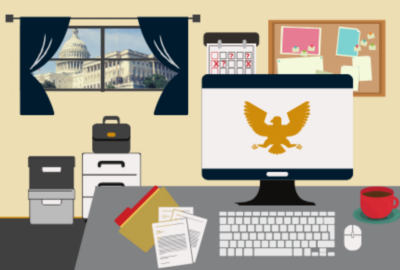The Federal Headlines is a daily compilation of the stories you hear discussed on the Federal Drive.
- Two former employees of the Drug Enforcement Administration are convicted of lying to the government during their top secret clearance application process. The Daily Caller reports. David Polos and Glen Glover neglected to disclose their ownership of a strip club. Both were found guilty of making false statements and face at least 10 years in prison. (The Daily Caller)
- The IRS will have to tighten its belt next year if House lawmakers have their way. An early draft of the fiscal 2017 spending bill cuts the agency’s budget by more than $200 million, and is $1 billion lower than what the agency wants from Congress. A House Appropriations subcommittee said the cut directs funding to taxpayer services, however, agency officials say if the IRS doesn’t receive full funding, customer service and cybersecurity will suffer. (Federal News Radio)
- The U.S. Digital Service will grow to 200 employees by the end of 2017, according to its administrator Mikey Dickerson. The Government Accountability Office said customer satisfaction for USDS and the General Services Administration’s 18F has been high, two-thirds of the agencies who responded are very satisfied with the Digital Service’s work. About 60 percent of customers said the same of 18F. (Federal News Radio)
- The National Institute of Standards and Technology says it’s developing a “minor” update of its Cybersecurity Framework. The update will be based on feedback from its users which asked NIST to lay out how the process of framework maintenance will work and how stakeholders will need to work together. It also wants to help organizations with cybersecurity risk management. The update is set to be published in early 2017. (National Institute of Standards and Technology)
- The Office of Management and Budget quietly put some policy muscle behind the latest initiative to create an identity management and access control solution for the citizen to government interaction. Federal chief information officer Tony Scott sent a memo to agency CIOs last month highlighting milestones and plans for the General Services Administration’s 18F’s new Login.gov effort. Federal News Radio obtained a copy of the memo, which hasn’t been publicly released. The memo details 18 milestones between now and Oct. 31 for GSA, OMB, NIST and other agencies. (Federal News Radio)
- Defense Secretary Ash Carter adds three new members to the Defense Innovation Advisory Board. Joining are Reid Hoffman, founder of LinkedIn. Bill McRaven, former U.S. Special Operations commander, and Walter Isaacson, CEO of the Aspen Institute. The board will meet this summer and have its first recommendations for Carter in the fall. (Federal News Radio)
- The IT system that handles almost all of the military’s travel arrangements is the next target for DoD’s digital “SWAT team.” By traditional government measures of IT performance, the Defense Travel System is not in trouble. These days, most DTS projects are meeting their cost and schedule targets, but Chris Lynch, the director of the new digital service, says it’s still a pain point for most defense employees who have to use it for official travel. Consequently, it’s one of the first projects his team is tackling. As a replacement, he says they’re working on a cloud-based software as a service offering, in collaboration with the DTS team. (Federal News Radio)
- The Defense Department asks its Defense Business Board to come up with a series of policy papers on the presidential transition. The goal is to give private sector advice to senior executives in the department on management transitions. Deputy Defense Secretary Bob work is in charge of the transition. He’s looking to preserve the legacy of Defense Secretary Ash Carter’s third offset strategy into the next administration. (Federal News Radio)
- The legislative branch takes a big step to ensure its own continuity of funding. The House approved its own 2017 appropriations. House and joint operations would be nearly $3.5 billion, not including Senate-only expenses, an increase of $73 million over this year. The bill includes a boost for the Library of Congress, the Architect of the Capitol, and the Capitol Police. The Government Publishing Office would be level funded. Members would have a pay freeze. (House Appropriations Committee)
Copyright
© 2024 Federal News Network. All rights reserved. This website is not intended for users located within the European Economic Area.




